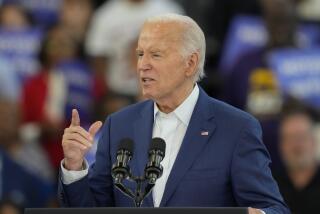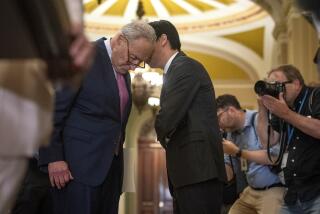Congress Balks at Rushing Vote
- Share via
WASHINGTON — As President Bush leans on Congress to authorize action against Iraq in a matter of weeks, many leading lawmakers--including some members of his own party--are bridling at the pressure and warning that considerably more groundwork needs to be laid before they are prepared to vote on the White House request.
“There is not consensus on many critical questions” about the use of force in Iraq, Senate Foreign Relations Committee Chairman Joseph R. Biden Jr. (D-Del.) and Sen. Richard G. Lugar (R-Ind.) warned in a letter Tuesday to the president.
The letter was sent as Bush prepared to deliver a major speech to the United Nations on Thursday that his aides said would present his strongest case for ousting Iraqi President Saddam Hussein.
At the White House, Bush on Tuesday continued his campaign to woo allied leaders to his cause. But Portuguese Prime Minister Jose Manuel Durao Barroso became the latest in a growing list of European leaders to signal opposition to unilateral U.S. action.
“Where there are global threats that have to have a global answer, we should act globally,” Durao Barroso said.
Although few doubt that Bush will win whatever authority he seeks from Congress whenever it comes to a vote, many lawmakers are expressing qualms about his preference that they address the issue before Congress adjourns in mid-October for the final weeks of this year’s campaigns.
“This will be one of the most important decisions Congress makes in a number of years; I do not believe it should be made in the frenzy of an election year,” said Rep. Tom Lantos (D-San Mateo). He said he is prepared to enthusiastically support a preemptive attack on Iraq, but he proposed that lawmakers meet in a special postelection session to vote on the matter.
Unless Bush changes course, however, Congress faces a month jammed with intelligence briefings, hearings and lobbying--a crash course on the threat that the administration believes is posed by Iraq. On Tuesday, officials fanned out around the Capitol for briefings to share intelligence with rank-and-file lawmakers as well as party leaders. The House Armed Services Committee held a hearing on Iraq’s weapons capability--the first open congressional hearing on the subject since lawmakers returned from a summer recess to find the capital ringing with talk of war.
The many voices of caution--at home and abroad--underscored the high stakes in Bush’s seminal speech Thursday, his first extended public address on the case for taking new action against Iraq. The immediate audience will be the U.N., but the speech is also considered crucial to winning support from wavering members of Congress as well as the public.
“After the president delivers his speech, that will be a beginning” of intense congressional scrutiny, said Sen. Olympia J. Snowe (R-Maine), who said she is not yet prepared to support authorizing the use of force.
Speaking with reporters after a visit Tuesday to the Afghan Embassy in Washington, Bush previewed the case he will make to the U.N. for action against Iraq.
“I’m deeply concerned about a leader who has ignored the United Nations for all these years, refused to conform to resolution after resolution after resolution, who has weapons of mass destruction,” Bush said of Hussein. “And the battlefield has now shifted to America, so there’s a different dynamic than we’ve ever faced before.”
A senior administration official said Bush in his speech will seek U.N. action--but not recommend a specific course.
“He is going to go to the U.N. and he will say that this is not just our problem, this is the world’s problem,” said the aide, who requested anonymity.
At the same time, the official said Bush will reserve the right to act without U.N. support or approval. “The president is also going to make very clear that the United States is not prepared to stand by and let this situation continue,” the aide said.
Administration officials have been downplaying the expectation that the speech will include new information on allegations that Hussein’s regime is producing weapons of mass destruction.
As Bush advisors made the rounds on Capitol Hill on Tuesday, lawmakers said little new information was offered. But the briefings, spearheaded by National Security Advisor Condoleezza Rice and CIA Director George J. Tenet, represented an aggressive new effort to expand the circle of members being briefed.
Bush’s allies are increasingly making the case that no “smoking gun” is needed beyond the existing record of Hussein’s efforts to develop nuclear and other weapons of mass destruction--coupled with new information that those efforts have intensified.
But skeptics say there is still not enough documentation on the threat posed by Iraq. Sen. Richard Durbin (D-Ill.) called on the CIA to develop an official estimate of Iraq’s ability to produce and deploy weapons of mass destruction, saying he was “stunned” to learn that such an assessment does not exist.
“We’re being asked to go to war, and vote on it in a matter of days,” Durbin said. “We need an intelligence estimate before we can seriously vote.”
Even some Democrats who are administration allies say they feel in the dark about the White House’s plans.
“I know so little about what they are specifically thinking,” said Rep. Howard L. Berman (D-Mission Hills), a longtime critic of Hussein who is prepared to support a preemptive strike. “They have not really reached out.”
The administration’s ability to make its case in detail to lawmakers may be key to bringing the matter to a quick vote. Some Democrats worry that an expedited timetable is rushing deliberations on a monumental issue--one that could have ramifications in this year’s congressional elections by shifting attention to national security issues that play to GOP political strengths.
“I know of no information that would suggest the threat is so imminent that we have to do it in October,” said House Minority Whip Nancy Pelosi (D-San Francisco).
Senate Majority Leader Tom Daschle (D-S.D.) has expressed worry about the politicization of the debate.
“It’s so important that we do this right, not rush to some judgment,” he said Tuesday.
Democrats are not alone in being uneasy about a quick decision in the heat of the campaign season, and at a time when many constituents--even in Republican districts--remain unswayed about the need for military action against Iraq.
“I’d like to see the vote after the election,” said Rep. Robert W. Ney (R-Ohio). “The president has some groundwork to do.”
Lugar, a respected Republican on foreign policy matters, and Biden urged Bush in their letter to do more to explain his long-term goals in the region, noting that is one of the issues on which national consensus seems to be lacking.
In the House, the Armed Services Committee began building the case for an attack in an open hearing on Iraq’s weapons capabilities. In blunt testimony, two former U.N. weapons inspectors warned that further inspections, if allowed, would not necessarily erase the threat posed by a dictator seeking weapons of mass destruction.
“If you have a regime that is determined to deny, to deceive, the inspectors don’t have a chance,” said Richard Spertzel, a former monitor who is an authority on the Iraqi biological weapons program.
*
Times staff writer Nick Anderson contributed to this report.
More to Read
Get the L.A. Times Politics newsletter
Deeply reported insights into legislation, politics and policy from Sacramento, Washington and beyond. In your inbox twice per week.
You may occasionally receive promotional content from the Los Angeles Times.









